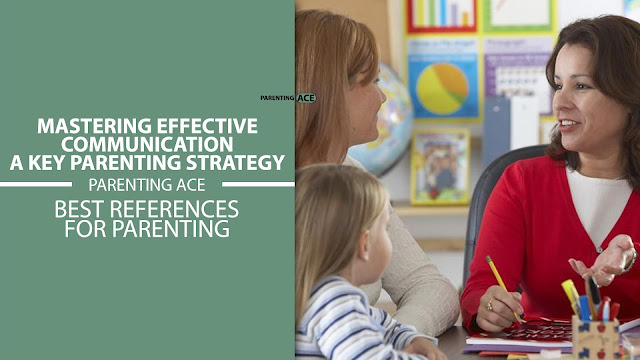Mastering Effective Communication: A Key Pillar of Effective Parenting Strategies
In the intricate tapestry of effective parenting, communication stands as the vital thread that binds the parent-child relationship. Welcome to our blog post, where we embark on an illuminating journey into the realm of effective communication in parenting. Here, we unravel the profound significance of listening, empathy, and dialogue in fostering understanding, trust, and connection within families. Join us as we explore the power of communication to nurture resilience, resolve conflicts, and cultivate a harmonious environment where children thrive emotionally, socially, and intellectually.
 |
| Mastering Effective Communication: A Key Parenting Strategy |
Effective communication stands as a cornerstone of successful parenting, shaping the dynamics of parent-child relationships and fostering a nurturing environment for growth and development. In this comprehensive exploration, we delve into the intricate role of communication within the realm of parenting, unveiling its profound impact on familial bonds, behavioral patterns, and overall child well-being. Through understanding the principles and practices of effective communication, parents can unlock powerful strategies to enhance connection, resolve conflicts, and cultivate harmonious relationships with their children.
Understanding Effective Communication in Parenting
Effective communication in parenting transcends mere verbal exchanges; it encompasses listening, empathy, and understanding. It involves not only conveying messages clearly but also actively engaging with children to comprehend their perspectives, emotions, and needs. By fostering open, honest, and respectful dialogues, parents create a supportive atmosphere where children feel valued, heard, and understood. Moreover, effective communication involves non-verbal cues such as body language, tone of voice, and facial expressions, which significantly influence the quality of interactions and convey underlying sentiments.
The Power of Active Listening
Active listening emerges as a pivotal component of effective communication in parenting. It entails giving full attention to what the child is expressing, without interruption or judgment, and demonstrating genuine interest in their thoughts and feelings. Through active listening, parents demonstrate empathy, validate children's experiences, and strengthen the bond of trust between them. By creating space for children to articulate their concerns and aspirations, parents gain invaluable insights into their worldviews and aspirations, paving the way for meaningful connections and collaborative problem-solving.
Navigating Difficult Conversations
Effective communication equips parents with the tools to navigate challenging conversations with sensitivity and grace. Whether addressing conflicts, setting boundaries, or discussing sensitive topics, such as discipline or personal issues, clear and compassionate communication is paramount. Parents can employ techniques such as "I" statements, which express feelings without assigning blame, and active problem-solving approaches to resolve conflicts constructively. By fostering an environment of mutual respect and understanding, parents foster resilience and emotional intelligence in their children, preparing them to navigate life's complexities with confidence and maturity.
Cultivating a Culture of Communication
To nurture effective communication within the family, parents must cultivate a culture of openness, authenticity, and mutual respect. This involves establishing regular communication routines, such as family meetings or mealtime conversations, where all members have the opportunity to share their thoughts, experiences, and concerns. Additionally, creating an environment free from judgment or criticism encourages children to express themselves freely and seek guidance when needed. By modeling respectful communication and active listening, parents set a powerful example for their children, fostering healthy communication patterns that extend beyond the family sphere.
Effective communication lies at the heart of effective parenting, serving as a linchpin for building strong, resilient, and harmonious parent-child relationships. By embracing principles of active listening, empathy, and open dialogue, parents can create a nurturing environment where children thrive emotionally, socially, and intellectually. As parents commit to mastering the art of communication, they unlock transformative strategies to navigate challenges, foster understanding, and cultivate enduring connections with their children, laying the groundwork for a future grounded in love, trust, and mutual respect.




